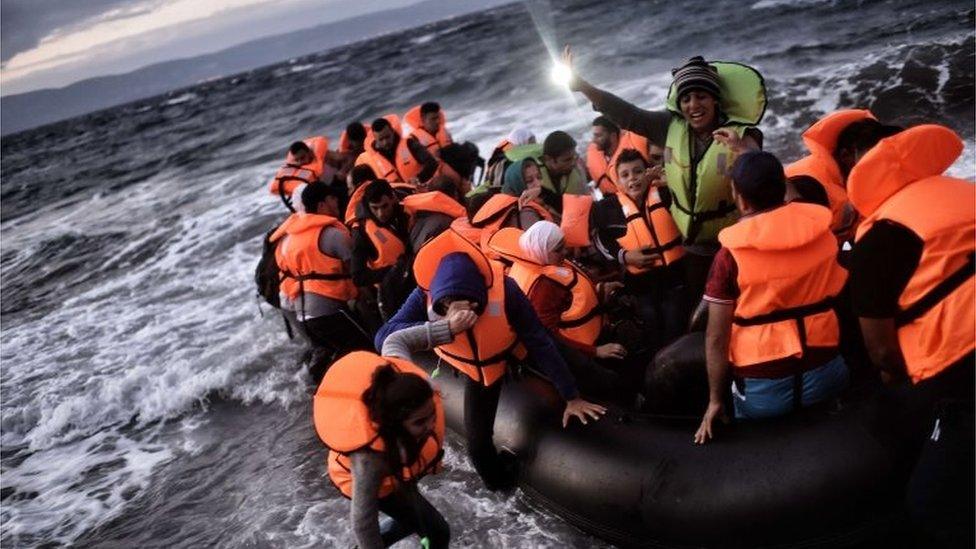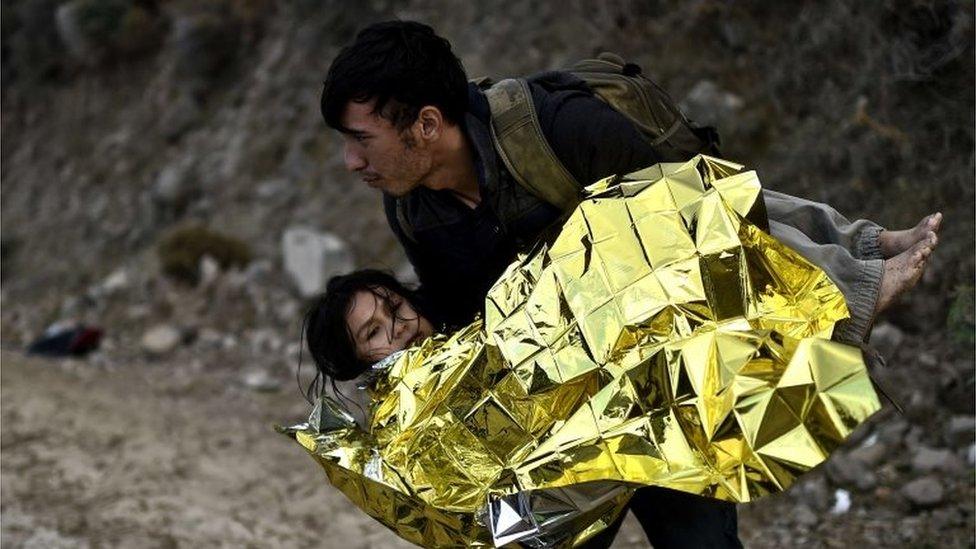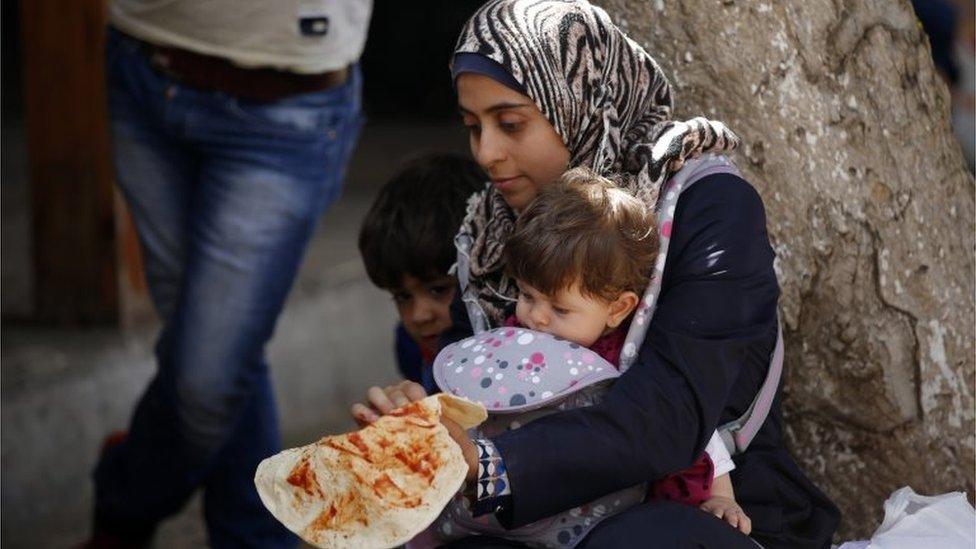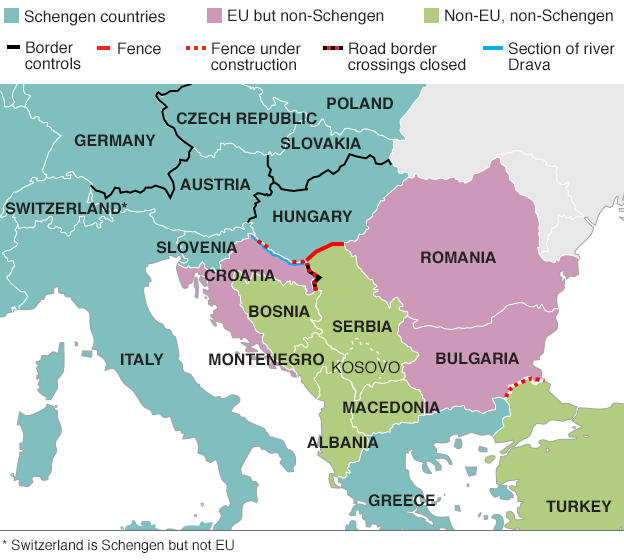Can Turkey help solve EU migrant crisis?
- Published
Turkey has become a gateway to Europe for Syrian refugees as Katya Adler reports.
"We want to convert to Christianity, finish our doctorates in economics and try for a test-tube baby."
An ambitious wish list for anyone but Rayya and her husband, Assif, are refugees from Homs, now a shell of a Syrian city.
I met them in Turkey, nervously waiting for a call from the people smugglers they had paid to send them across the Mediterranean to Europe. This was their second attempt at crossing.
They'd previously spent three days hiding in the undergrowth by Turkey's shoreline, waiting for another smuggler who never showed up.
I asked them why they were risking everything again when Turkey was a safe place for them to live.
"Things are bad here," Assif told me. "We live hand to mouth in Turkey and there is war here too in the south east (with the Kurdish PKK). Why leave our country of war, to stay in another war country? We are looking for safety. We are looking for freedom. We are looking for life."
Cynical industry
Europe is so tantalisingly close for refugees in Turkey. Every day about 5,000 make the crossing to nearby Greek islands. And EU leaders are beginning to panic.
Turkey's long western shoreline with its countless remote coves is hard to police and the Turkish authorities make little effort.
People smugglers roam freely around Turkey's coastal towns and cities whispering fantasies of happy ever after in the ears of the desperate.
Boats stuffed with human cargo regularly set off in broad daylight.
And a cynical industry has sprung up to help them on their way. Cheap and probably pretty useless lifejackets hang everywhere along busy streets, in shoe to sports shop windows, their owners eager to earn a few lira from those about to risk their lives at sea.

More than 514,000 people have crossed the Mediterranean into Europe this year already, according to the UN
The EU is now pressurising Turkey for permission to help patrol its coastline.
In meetings in Brussels on Monday, the presidents of the European Council and the European Commission will also tell Turkey's president he should build more and better refugee camps.
They hope that will persuade Syrian refugees to stay put and they're offering some financial aid.
Right now, only a fraction of the two to three million Syrians in Turkey receive help from the government. It refuses to officially recognise them as refugees but as "guests" they have no automatic right to housing, healthcare, work or higher education.

Thousands of Syrians are travelling across the Aegean sea on rickety boats that are vulnerable to heavy seas
Mahmut, a Syrian, lives in Izmir, Turkey's third largest city. He helps fellow refugees and thinks the EU offering more aid is misguided, as money can't buy stability or the promise of a better future for refugee families, he says.
And, he told me, it was a question of jealousy too as most refugees now have a friend or relative in Europe and they compare their life in Turkey with their relatives in Germany for example who get somewhere to live, schooling, residency and even the possibility of citizenship further down the line.
"Refugees in Turkey want that too," says Mahmut. "So they go." Many Turks are only too happy to see them leave.
Without much aid from the state, Syrian refugees rely on locals to get by.
'Opens the doors...and the seas'
Chatting to people in shops and cafes in Turkey, I found migration to be as divisive a debate there as it is in the EU.
On the one hand, there is a strong sense of moral obligation. Many Turks have relatives in Syria. They feel they should help.
But I frequently heard refugees described with resentment as a "burden". The economy in Turkey isn't as buoyant as it used to be and people complain of begging Syrians lining the streets and 'stealing their jobs' by working illegally.
One shopkeeper told me Turkey simply couldn't deal with the huge numbers of refugees that have fled there.
"Our president opens the doors to let them in," he said, "Then opens the seas to let them drown. "

Turkey has taken in two to three million Syrian refugees leading to some resentment among locals in cities such as Izmir (pictured)
The Turkish president carefully cultivates an authoritarian, strongman image and he needs to keep that up ahead of tight elections in Turkey. He won't come to Brussels to be pushed around.
The EU is telling him how to better patrol his borders and what to do with refugees in his country and so he intends to slap a list of his own daunting demands on the table.
He wants EU support to establish a "safe zone" in northern Syria, just over the Turkish border and suggests building huge refugee camps there. Europe's leaders, notably Angela Merkel have already ruled out that possibility.
He also insists the EU should do more to help end the conflict in Syria and that Europe should take in more refugees in the meantime.
The talks will be tricky - relations are already tense after a couple of decades of failed negotiations on Turkey's possible accession to the EU.
The two sides will most probably agree to co-operate more closely - the EU will slip in a sweetener of promising to accelerate the process of lifting visa restrictions on Turkish travellers. But Europe is naive if it thinks Turkey can solve its migrant crisis.
As refugees continue to bleed out of Syria, most believe it is in Europe that their best chance of a new future lies.

